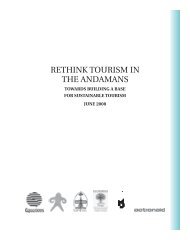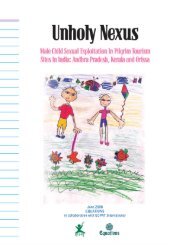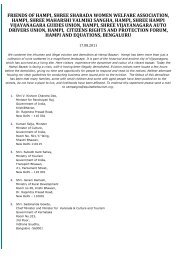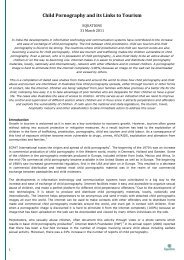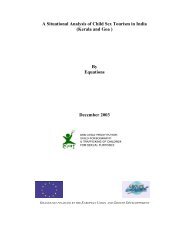Nilgiris Biosphere Reserve - Equitable Tourism Options
Nilgiris Biosphere Reserve - Equitable Tourism Options
Nilgiris Biosphere Reserve - Equitable Tourism Options
Create successful ePaper yourself
Turn your PDF publications into a flip-book with our unique Google optimized e-Paper software.
a Scheduled Tribe. Seventy-five of the 698 Scheduled Tribes are identified<br />
as Primitive Tribal Groups considering they are more backward than<br />
Scheduled Tribes. They continue to live in a pre-agricultural stage of<br />
economy and have very low literacy rates. Their populations are stagnant<br />
or even declining.<br />
The Constitution through several Articles has provided for the socioeconomic<br />
development and empowerment of Scheduled Tribes. (You may<br />
list the provisions here, if necessary). But there has been no national<br />
policy, which could have helped translate the constitutional provisions into<br />
a reality. Five principles spelt out in 1952, known as Nehruvian<br />
Panchasheel, have been guiding the administration of tribal affairs. They<br />
are:<br />
• Tribals sllould be allowed to de ve lop according to tll eir own genius<br />
• Tribals I rights in land andforest should be respected<br />
• Tribal teams should be trained to undertak e admin istration and<br />
de velopment wit/lOut too many outsiders being inducted<br />
• Tribal de velopment should be undertaken without di'lturbing tribal social<br />
and cultural institutions<br />
• The index of tribal de ve lopment should be the quali(v of the ir life and not the<br />
mon ey sp ellt<br />
Realising that the Nehruvian Panchasheel was long on generalities and<br />
short on specifics, the Government of India formed a Ministry of Tribal<br />
Affairs for the first time in October 1999 to accelerate tribal development.<br />
The Ministry of Tribal Affairs is now coming out with the draft National Policy<br />
on Tribals. Based on the feedback from tribal leaders, the concerned<br />
States, individuals, organisations in the public and the private sectors, and<br />
'JGOs, the Ministry will finalise the policy.<br />
The National Policy recognises that a majority of Scheduled Tribes<br />
:;ontinue to live below the poverty line, have poor literacy rates, suffer from<br />
nalnutrition and disease and are vulnerable to displacement. It also<br />
3cknowledges that Scheduled Tribes in general are repositories of<br />
ndigenous knowledge and wisdom in certain aspects.<br />
rhe National Policy aims at addressing each of these problems in a<br />
;oncrete way. It also lists out measures to be taken to preserve and<br />
)romote tribals' cultural heritage.<br />
79 NiJagiris : Fading Glory





